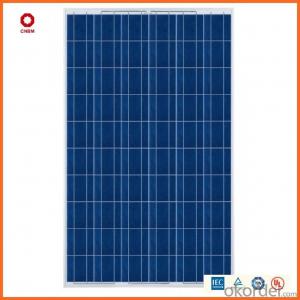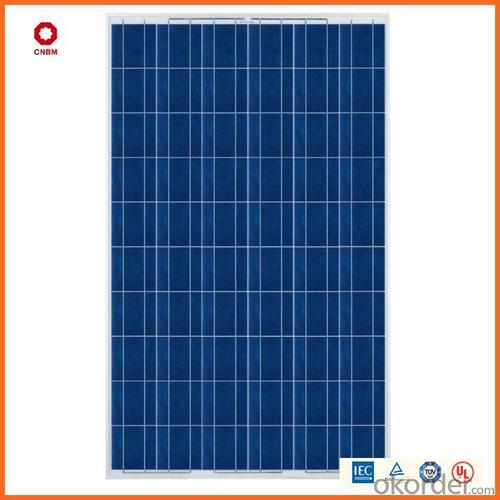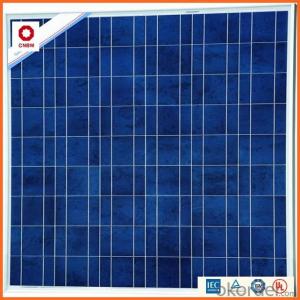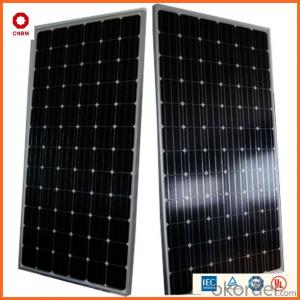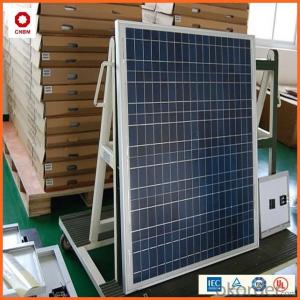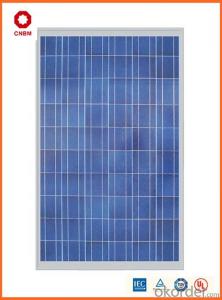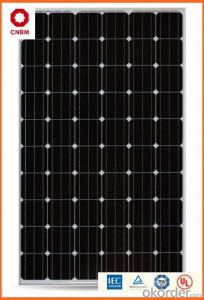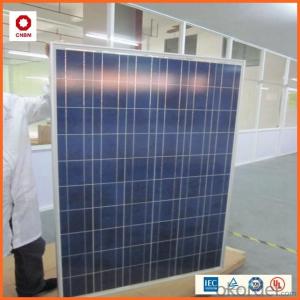Ms Solar Panels 150w Monocrystalline Silicon Solar Module with CE/IEC/TUV/ISO Approval Standard Solar
- Loading Port:
- China main port
- Payment Terms:
- TT OR LC
- Min Order Qty:
- 100 watt
- Supply Capability:
- 1000000 watt/month
OKorder Service Pledge
OKorder Financial Service
You Might Also Like
Specification
Solar 80W Monocrystalline Silicon Solar Module With CE/IEC/TUV/ISO Approval Standard Solar
CNBM International Corporation is a professional solar panel manufacturer in China for CNBM brand . Silicon panel ( silicon module), as our main product, has high quality and good service. Our products are very popular in Europe, Australia, England, Middle East, Mexico, Argentina, Chili, Singapore and Africa.
Furthermore, our products have gained international authorized certificates like TUV, UL and CE.
China National Building Material (Group) Corporation (CNBM), established in 1984, is one of the largest State-owned group corporations of building & mechanical materials which specializes in the design, manufacturing and distribution of building materials in the world.
As the whole world turns “green”, CNBM enters into the Photovoltaic Industry in 2005.After 6 years' fast growth, now our annual capacity is 500MW solar panel and 500MW solar cell.
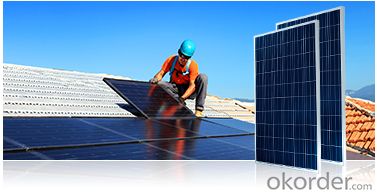
We now provide
• Monocrystalline Solar Panel
• Polycrystalline Solar Panel( multicrystalline silicon Solar Panel)
Features of our products:
Long lifespan: 25Years lifetime guarantee, 12years workshop warranty. 90% output in first 10years. 85% output in next 15years.If module fail during warranty period, please contact local dealer, and provide the warranty card to replace the products.
Solar panels are withstand extreme working condition (from -40°C to 120°C)
Grade A solar panels rated by TUV.
High transformation efficiency solar panels
New UV reflector protected Layer
Maintenance free solar panels
No exposed metal parts
Custom-made available
100% EL TEST before and after laminator for each solar panels
TUV,MCS,CEC,IEC61215,IEC61730,CE,UL approved solar panels
CHUBB insurance company to guarantee the quality of solar panels
Bankable solar panels in German,Italy,UK,Denmark country
As a professional Solar Panel manufacturer and Supplier in China, we have our customers come around the whole world and our specialization has got a worldwide recognition. Meanwhile, with our superior quality, competitive price, prompt and excellent service, As main role in trade section of CNBM Group, CNBM International Corporation supplies products including Monocrystalline Solar Panel, Polycrystalline Solar Panel ( multicrystalline silicon Solar Panel) have received and enjoyed famous reputation in many countries and regions in the world.
- Q: I am confused. I am planning to build a simple 2Watt solar system to power some lights in my house. . I wonder if it is possible to power up a 2Watt bulb using 2Watt solar power?2. Normally, when we are reading the power rating of a bulb, we will read the wattage, so what about the voltage and current rating?3. If the current is insufficient, will the bulb light up?I am having a solar panel that can output 2W power but I am not sure about the output voltage, how can I find out about the current? I am getting really confused.
- Unlikely - at least not a full brightness. You have to match voltages. If your panel is 2v at amp, it won't run a 20v bulb that runs at /0 amp. You're also going to lose power in the wiring and other components that means the 2w panel won't really deliver its full rating. And I'm also guessing that the 2w of the panel is only under full, bright sunlight, so any lessening of the light; clouds, haze, fog, dust, will lessen the power available.
- Q: I have a cabin that is way out in the middle of no where, it would cost 000's of dollars to get power to it. If I have a 8,000 BTU air conditioner that runs on 25 volts and 5 amps (or 875 watts)How many solar panels will I need to run this during the day, plus charge the batteries to run it all night? How many batteries would I need
- OK, in addition to the solar panels, you wil need an inverter (DC to AC; 2V t0 20V) capable of delivering 20A continuously and as much as 40A for the compressor starting surge, and a fairly large battery bank capable of delivering something over 2000 watts continuously (losses in the charging and conversion process) as well as the surge. So, if your actual demand is now calculated around 2000 watt/hour, and you need to both run the unit and charge batteries during the daylight hours - and considering that the ideal charging rate for a lead-acid battery is on the order of 0% of its capacity, you will need a huge reserve on the battery section and a huge excess on the solar section to make up for the 5 hours maximum input. So, the average high-quality deep-discharge battery will do about 400Ah @ 2.6V. Which comes to 5040 watts for one hour. For round figures, it will give you 2000 watts for 2.5 hours. You will need a minimum of eight of them just to make your system run for the 9 hours you are anticipating. Given that you do not want to run the batteries to zero each night, a 50% reserve would be a wise investment - comes to now twelve (2) batteries. Now, you will have to make 2000 watts (to run the unit) and also produce and another 8600 (per hour for five hours) watts to charge the batteries for the next night. Again, for round figures, you will need 0,000 watts of solar power, or seventy (70) panels. At ~0 watts/s.f. (00 watts/meter), that comes to about 000 square feet or 00 square meters. Modern non-crystaline panels may reduce this by 20%, or so but no more than that. You will be charging the batteries at roughly 20% of their discharge capacity - which will pretty much cut their service live in half, or so. As the average deep-discharge battery has about an 8-year life span under ideal conditions (and your situation will be far from ideal) you may expect to replace them every four years or so with good care. Much less with no care.
- Q: i attached a usb charger to my solar panel(it has an output of about .2 volts) but i read on my multimeter its only using about 8 volts however on the conventional wall charger that i use to charge it has an output of about 5. volts.... i believe that my mp3 player is not charging it does not display the charging icon when it is on or off ....is this becuase the output is higher ? do i need to install a volt dropping diode to prevent it from putting to much energy at once? (my mp3 charges fine on the wall charger but does not seem to respond to the solar panel so it the circuits are fine....)
- 5.3V is the open voltage or? So the full wattage of the photograph voltaic panel is 45W or so? i assume you are able to no longer make all your small A/C home equipment into DC ones. so which you would be able to think of bearing directly to the 2V DC enter 00W inverter. this type of inverter might have a some bit extensive enter voltage variety from like V-20V some situations.
- Q: I want to build solar panels for my house.Dose anyone try okorder is this really work?
- you okorder they have solar panels
- Q: I thought they were going to make solar powered cars and solar power plants among other things. It was only nearly 0 years ago that solar power was the big thing. Just curious, why did it die out?
- I saw a commercial the other night for a fan you hook onto the top of your car window, and it's solar-powered. (supposedly cools off your car while gone...as opposed to just cracking the windows some). Also, I've seen traffic lights and emergency beacons on the highway powered by solar panels.
- Q: I am in the market for buying a home. There is one for salke that actually has solar panels on top. How are they used? Do you need to pay for gas and electric still. Does it really light up the house and keep it warm. WHat about the AC keeping hte house cool in the summer does it work for that too? Please explain in solar for dummy terms. I haveno clue about solar panels other thatn the fact that it needs sunlight to run.
- No standard home can operate on solar panels alone unless there is about an acre or more of them. Plus, they require lots of batteries and complicated switching devices. And, they are very expensive, so rarely pay back their up front cost. Right now, more of a gimmick than a practical solution to power needs in the home. The house you're looking at may use it to power emergency lighting in case the grid went down. Or maybe a small fan to exhaust heat out of the attic. Who knows. Just have to ask.
- Q: i would like to hook up a power outlet to a solar panelmy light system is 500watts will run for 8 hours/day between noon to 8PM.So what is the most effective system do I need?
- You CANNOT directly hook up anything to your solar panel that is ac as your solar panel is dc. You need several things in order to make it work correctly. I have put up a small diagram of how basic solar works and have included a link below where you can see it. Then if you have further questions, I will be more than happy to answer them for you if I can. Thanks Rock
- Q: Can solar panels be installed on remote monitoring systems?
- Yes, solar panels can be installed on remote monitoring systems. Solar panels provide a reliable and sustainable source of energy for remote monitoring systems, allowing them to operate autonomously and continuously in remote locations without the need for grid power or frequent battery replacements.
- Q: Can solar panels be used in areas with limited space?
- Yes, solar panels can be used in areas with limited space. There are various types of solar panels available, including smaller and more compact designs that can be installed in tight spaces such as rooftops, balconies, or even on the sides of buildings. Additionally, solar panel technologies are continuously evolving, allowing for improved efficiency and the ability to generate more power from a smaller surface area.
- Q: How much roof space is needed for solar panels?
- The amount of roof space needed for solar panels varies depending on various factors such as the size and efficiency of the panels, the energy requirements of the building, and the geographical location. However, on average, a typical residential solar panel system requires approximately 100 to 400 square feet of roof space.
Send your message to us
Ms Solar Panels 150w Monocrystalline Silicon Solar Module with CE/IEC/TUV/ISO Approval Standard Solar
- Loading Port:
- China main port
- Payment Terms:
- TT OR LC
- Min Order Qty:
- 100 watt
- Supply Capability:
- 1000000 watt/month
OKorder Service Pledge
OKorder Financial Service
Similar products
Hot products
Hot Searches
Related keywords
